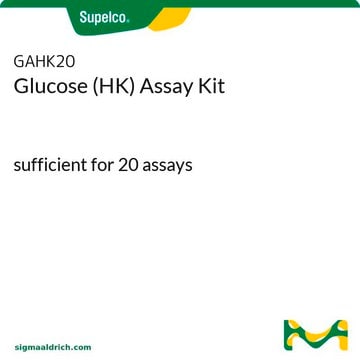SML0172
Cercosporamide from Cercosporidium henningsii
≥98% (HPLC)
Synonyme(s) :
4-Dibenzofurancarboxamide
Se connecterpour consulter vos tarifs contractuels et ceux de votre entreprise/organisme
About This Item
Formule empirique (notation de Hill):
C16H13NO7
Numéro CAS:
Poids moléculaire :
331.28
Code UNSPSC :
12352200
Nomenclature NACRES :
NA.77
Produits recommandés
Niveau de qualité
Essai
≥98% (HPLC)
Solubilité
chloroform: 1 mg/mL
ethyl acetate: 1 mg/mL
DMSO: 5 mg/mL (Solution in DMSO is unstable and thus should be freshly prepared.)
Température de stockage
−20°C
InChI
1S/C16H13NO7/c1-5(18)10-7(20)4-9-16(2,14(10)22)12-8(21)3-6(19)11(15(17)23)13(12)24-9/h3-4,19-21H,1-2H3,(H2,17,23)/t16-/m1/s1
Clé InChI
GEWLYFZWVLXQME-MRXNPFEDSA-N
Application
Cercosporamide from Cercosporidium henningsii has been used as a mitogen-activated protein (MAP) kinase-interacting kinase (MNK) inhibitor in glioblastoma (GBM)-derived BS287 spheres. It has also been used as an inhibitor of bone morphogenetic protein receptor (BMPR) type I kinase in HepG2 cells and zebrafish embryos in particular to test its rescue potential against developmental defects.
Actions biochimiques/physiologiques
Cercosporamide was initially identified as a phytotoxin with broad-spectrum anti-fungal activity. Studies have shown that cercosporamide is a specific, highly potent fungal inhibitor of the cell wall integrity-signaling pathway mediator, protein kinase (Pkc1) inhibitor. Semisynthetic cercosporamide analogues demonstrated hypoglycemic activity and therefore, serve as candidates for potential new anti diabetic drugs. Cercosporamide was found to block eIF4E (Eukaryotic Initiation Factor) phosphorylation in cultured cancer cells, inducing apoptosis, suppressing proliferation, and reducing soft agar colonization. Its eIF4E phosphorylation inhibitory effect was also shown when administrated orally on xenograft human tissue and mouse liver tissue. Cercosporamide is a potent and selective Mnk inhibitor. It reduces tumor growth in xenografted HCT116 tumor and suppresses the outgrowth of B16 melanoma lung metastases. Hence, blocking Mnk function and eIF4E phosphorylation may be an attractive anticancer strategy.
Notes préparatoires
DMSO solution (1 mg/ml), kept at -20 °C, is stable for at least three months.
Faites votre choix parmi les versions les plus récentes :
Déjà en possession de ce produit ?
Retrouvez la documentation relative aux produits que vous avez récemment achetés dans la Bibliothèque de documents.
Akihiro Furukawa et al.
Bioorganic & medicinal chemistry letters, 20(7), 2095-2098 (2010-03-12)
In an investigation of (-)-Cercosporamide derivatives with a plasma glucose-lowering effect, we found that N-benzylcarboxamide derivative 4 was a partial agonist of PPARgamma. A SAR study of the substituents on carboxamide nitrogen afforded the N-(1-naphthyl)methylcarboxamide derivative 23 as the most
Li-Wei Wang et al.
Applied microbiology and biotechnology, 93(3), 1231-1239 (2011-08-05)
Through bioassay-guided fractionation, the EtOAc extract of a culture broth of the endophytic fungus Phoma species ZJWCF006 in Arisaema erubescens afforded a new α-tetralone derivative, (3S)-3,6,7-trihydroxy-α-tetralone (1), together with cercosporamide (2), β-sitosterol (3), and trichodermin (4). The structures of compounds
Kenji Wakabayashi et al.
Biological & pharmaceutical bulletin, 34(7), 1094-1104 (2011-07-02)
Peroxisome proliferator-activated receptor γ (PPARγ; NR1C3) is known as a key regulator of adipocytogenesis and the molecular target of thiazolidinediones (TZDs), also known as antidiabetic agents. Despite the clinical benefits of TZDs, their use is often associated with adverse effects
Michal Grzmil et al.
Cellular signalling, 28(9), 1412-1421 (2016-06-12)
Current standard-of-care treatment for malignant cancers includes radiotherapy and adjuvant chemotherapy. Here, we report increased MAP kinase-interacting kinase (MNK)-regulated phosphorylation of translation initiation factor 4E (eIF4E) in glioma cells upon temozolomide (TMZ) treatment and in medullary thyroid carcinoma (MTC) cells
Maya P Singh et al.
Journal of industrial microbiology & biotechnology, 37(4), 335-340 (2009-12-25)
Fungi are well known for their vast diversity of secondary metabolites that include many life-saving drugs and highly toxic mycotoxins. In general, fungal cultures producing such metabolites are immune to their toxic effects. However, some are known to produce self-toxic
Notre équipe de scientifiques dispose d'une expérience dans tous les secteurs de la recherche, notamment en sciences de la vie, science des matériaux, synthèse chimique, chromatographie, analyse et dans de nombreux autres domaines..
Contacter notre Service technique





